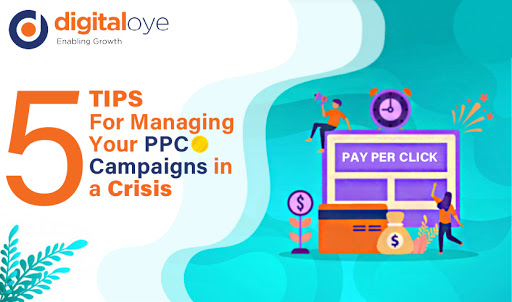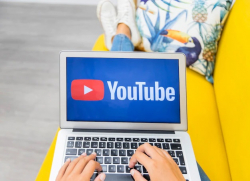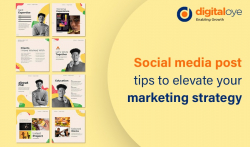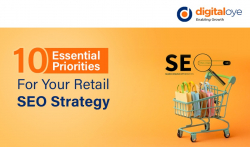8 May 2020 Posted By : Sakshi

The global economy is crumbling due to the ongoing COVID-19 Pandemic. It has affected all types of businesses in some way or the other. Similarly, the Pandemic also has a massive impact on the search engines, PPC & SEO agencies and eCommerce - clients are pausing their projects and services, and companies are laying off staff.
Amid this economic downturn, how should online advertising companies react? Should they cut down on their budget and wait for things to get better?
In this article, we will try and figure out how the agencies should help their clients manage and run effective PPC campaigns in a world that has been tossed upside down.
Let's dive in!
How should PPC Managers Ensure Return on Ad Spend
Let's try to understand one thing - It is not a feasible option for many businesses to continue their PPC ad spend, mainly because the industry they are operating in has directly affected the economic crisis or downturn.
So, if this is the case, it is better to simply cut down your PPC budget and focus on more organic methods like SEO.
That said, if your business managed to remain operational with little to less impact, here are five tips that might help you with your and your clients' PPC endeavours -
1. Calm down!
Yes, this might not be a tip that you'd have expected in this article, but believe us, it works!
When the outbreak first began, some of our clients reacted by pausing their bidding immediately. But those who took things slow and were patient enough at the beginning of the Pandemic, we saw some surprising results! No, they did not get hundreds and thousands of leads pouring in, but what they did get was leads and conversions at a fraction of the cost compared to the past few weeks.
For industries that are still managing amid the outbreak hit, CPCs have been much lower (even 50% lower in few cases), whereas search visibility has massively improved.
True, online conversions have generally been low for almost all businesses. However, those clients who are still running PPC campaigns are seeing much lower cost-per-conversion, due to the number of reduced cost-per-clicks, and reduced online competition. This means that their advertising campaign is catching more attention in the SERPs than they would have a few weeks back.
Therefore, the first tip is to stay calm and analyze what is happening in your particular niche area, make informed decisions, and adapt. Avoid taking rash decisions without investigating the immediate threat.
2. Direct your campaigns towards brand terms
If PPC advertisers have to cut down on their PPC budget, they must still continue to bid on brand keywords and phrases.
Brands can always rely on brand keywords. This is probably because people who search using these brand terms are more likely to be in the "consideration phase" - even if they are looking to compare your brand with your competitors.
Another advantage of sticking to the brand keywords is that they tend to be less costly than other generic niche-based keywords.
Therefore, the fact that these keywords are incredibly cost-effective and high-intent; they should be the last ones to be chopped off from the overall PPC budget.
3. Revisit your buyer's persona
In the light of significant events like the COVID-19 Pandemic, agencies and clients must rethink their target audience and buyer's persona. Dig deep and focus on more individual details of your ideal customer.
Health and economic crisis can change people's beliefs, priorities, goals, mindset, and challenges. So you need to rethink how you fit into this crisis.
Consider these two points -
How does your offering cater to your audience's pain points: For example, if you're a software-based company, your target audience might have new needs around managing work-from-home and remote teams.
What does your audience should know before they make a purchase decision: This point revolves around how a crisis can dictate a buying decision. Presently, people are fearful of their health and income source. Consider how this can affect their decision - will they require more guarantee and refund options? Are your offerings reassuring enough, or do you need to make amends in your contractual terms?
In uncertain times like these, advertisers must adopt immediately to reassure their prospects.
Therefore, considering the behavioural shift in your audience during the crisis, with a possibility of not returning back to "normal" post-crisis, you should rethink your buyers' persona and make a change to your advertising message, instead of conveying the same old message to the same old audience.
4. Update your landing page
Earlier, brands had quite aggressive, direct CTAs on landing pages. But, amid the crisis, it is better to switch to softer conversion messages for the audience.
In challenging times, your audience might hesitate to commit to your offering, understandably so. Therefore, please reduce the commitment barrier, improving your chances of receiving higher conversion rates. You can initiate this by softening the CTA on your website or by offering an alternative buyer's journey.
For example, if you're in the business of designing websites, instead of asking the audience to speak to your design consultant immediately in your CTA, take a softer approach - "If now isn't the right time for you to get your website redesigned by us, download our collection of free website templates. Simply try them yourself, or book one of our website designing webinars." This way, you evoke a feeling of trust in your brand, keeping your audience engaged.
5. Conduct keyword research
According to Google Trends, COVID-19 has had a significant impact on a user's search behaviour. In many cases, the products and services that were being less searched for are receiving more traffic today. This said many brands are struggling with their PPC strategy because the keywords they are currently targeting has seen a significant conversion drop, calling for a quick urgency of making changes to the PPC strategy.
To meet the abrupt change in your potential customer's search behaviour, you have to adjust your PPC strategy. And the first step in every PPC strategy is to conduct a keyword search.
This is the time when you invest a reasonable amount of time in analyzing your every offering to shortlist those which are currently in demand. Based on this, you should conduct a competitive analysis and keyword research from scratch and finally create and publish your PPC ad online.
Final Thoughts: With the right mindset and PPC strategy, advertisers can still thrive!
To summarize, advertisers should not make hefty decisions without understanding the complete situation. Adaptation is the key! Those advertisers who adapt to the current needs of the audience and marketers alike are the ones who will come out stronger after our lives go back to normal.
Consider this angle - If you stop advertising overnight, you might actually end up giving your competitors an upper hand who are readily adapting to the situation, targeting a new set of keywords, rethinking their audience, managing budget, and catering the audience in innovative ways.
For both PPC agencies and clients - now is the time to think out of the box!
DigitalOye is one of the leading PPC Company in Delhi that has completed over a hundred PPC projects for various clients and brands. As these uncertain times continue to exist, we understand that many brands out there are struggling to keep up with the changing trends and PPC targeting. To guide you with your PPC campaigns, we are one of the best PPC advertising company India that will always be at your service.
 How to Promote Real Estate Business on Facebook
How to Promote Real Estate Business on Facebook
 Promote Astrology Services with Digital Marketing
Promote Astrology Services with Digital Marketing
 Ways To Improve Video Ranking in YouTube
Ways To Improve Video Ranking in YouTube
 Strength and improvement – Drive More Leads With Our Aviation SEO Services
Strength and improvement – Drive More Leads With Our Aviation SEO Services
 SEO Services For Air Ticketing Websites That You Ought To Consider
SEO Services For Air Ticketing Websites That You Ought To Consider
 Want SEO Services for Pharmaceutical Industry?
Want SEO Services for Pharmaceutical Industry?
 Social Media Post Tips To Elevate Your Marketing Strategy
Social Media Post Tips To Elevate Your Marketing Strategy
 SEO For Small Businesses – How To Grow Your Organic Traffic Fast
SEO For Small Businesses – How To Grow Your Organic Traffic Fast
 SEO For Pharmacy Industry: Complete Guide To Get The Rank
SEO For Pharmacy Industry: Complete Guide To Get The Rank
 10 Essential Priorities For Your Retail SEO Strategy
10 Essential Priorities For Your Retail SEO Strategy
Among the top digital and performance marketing agencies in Delhi NCR, we have been providing marketing solutions to companies from across the globe. To make real difference to your business, get in touch with us today! Call us at Tel: +91-721 7894 696 or email at sales@digitaloye.com to talk to our experts.